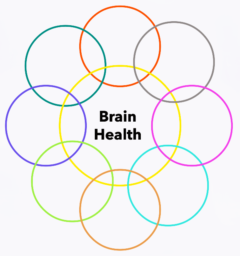Social connections? They’re not just for fun or passing the time. Believe it or not, your social life is like a gym workout for your brain. Yep, talking to folks and maintaining those connections gives your brain a good flex, keeping it in tip-top shape.
The science behind this is fascinating. Studies have shown that when we engage with others, our brains release neurotransmitters like dopamine and oxytocin, which not only make us feel good but also support brain plasticity. Brain plasticity is basically your brain’s ability to change and grow, and it’s super important for keeping those cognitive functions sharp.
Different types of social connections can benefit the brain in unique ways. Family and friends provide emotional support, which can be a buffer against stress—a known brain health zapper. Sharing a laugh or working through problems together builds resilience, not just in life, but right upstairs in your noggin too.
Diving a bit deeper, even more casual connections, like chatting with your barista or neighbor, can throw your brain into a higher gear. These interactions keep your mind nimble and can help with faster thinking and better problem-solving skills. Picture it like giving your brain a vitamin boost: Seems minor at first, but the effects build up over time to seriously bolster your brain’s health.
Building Healthy Social Connections
Building and maintaining meaningful relationships is like cultivating a garden. It requires some effort and attention, but the payoff is a more fulfilling and enriched life. Healthy social connections aren’t just nice-to-haves—they’re essential for your well-being.
Start by being open and genuine in your interactions. Share a bit about yourself, listen actively, and show empathy. People notice when you genuinely care, and it fosters trust and deeper connections.
Don’t be afraid to let your humor show. A shared laugh can be the foundation of a great relationship. Remember, it’s often the little things, like cracking a joke or recalling a funny memory that cement friendships.
Making time for your relationships is crucial. Whether it’s a quick text to check-in or scheduling regular catch-ups, these small gestures show that you value the person and the connection. Consistency is key.
Healthy relationships also involve setting boundaries. Know your limits and communicate them kindly. This creates mutual respect, a crucial component of any bond.
Finally, be mindful of the quality of your relationships. Evaluate whether they bring positivity and support into your life. Seek connections with those who inspire, motivate, and bring joy.
In the end, the connections we build and nurture can significantly enrich our lives and enhance our brain’s ability to adapt and thrive.
Simple Practices to Increase Brain Connections
Boosting brain connections might sound like a science experiment gone wild but have no fear—there are simple ways to give your brain a solid workout. And no, it doesn’t involve complex formulas or equations.
Engage in activities that get those neurons firing. Puzzles, reading, or even learning a musical instrument can amp up your brain’s agility. These activities encourage the growth of new neural pathways, enhancing your memory and problem-solving skills along the way.
Social engagement acts like brain fuel. Participating in group activities, whether it’s a casual game of charades or a lively book club discussion, invites a flood of new ideas and perspectives, keeping your brain sharp and on its toes.
Don’t underestimate the power of physical exercise in this mix. Exercise doesn’t just tone your body; it boosts blood flow to your brain, promoting the birth of new brain cells. It’s like a two-for-one deal where you get fitter and brain healthier at the same time.
Lifelong learning—not as daunting as it sounds—is a great tool for brain connection growth. Pick up a hobby, take a course, or even explore a new genre of music or film. This constant learning nudges your brain to form and strengthen connections, making it more robust against the wear and tear of aging.
Remember, pushing your brain a bit out of its comfort zone with these activities can create more resilient connections. It’s about keeping your mind lively, adaptive, and ready to tackle whatever life throws your way.
The Powerful Influence of Social Interaction on Brain Health
Social interactions do more than just fill your calendar—they play a monumental role in mental well-being. Engaging with others provides your brain with a unique form of stimulation that’s hard to replicate in isolation.
When you interact, your brain is working on overdrive to process social cues, emotions, and body language. All this activity helps maintain your brain’s health and even enhance cognitive abilities like memory and reasoning.
Consider how after a hearty conversation you often feel buoyant, energized. That’s the fuzzy result of neurotransmitters, like serotonin, being released—mood lifters that prime your brain for better function. It’s a little workout that rewards with clarity and creativity.
Real-world examples abound. Older adults who maintain an active social life are often seen with sharper minds and a reduced risk of cognitive decline. Simpler interactions, like a community gathering or regular calls with friends, can work wonders.
Finding balance in your social life is crucial, though. It’s not just about being constantly social but giving yourself enough personal time to recharge. This balance ensures your brain gets both the stimulation and rest it needs to thrive.



